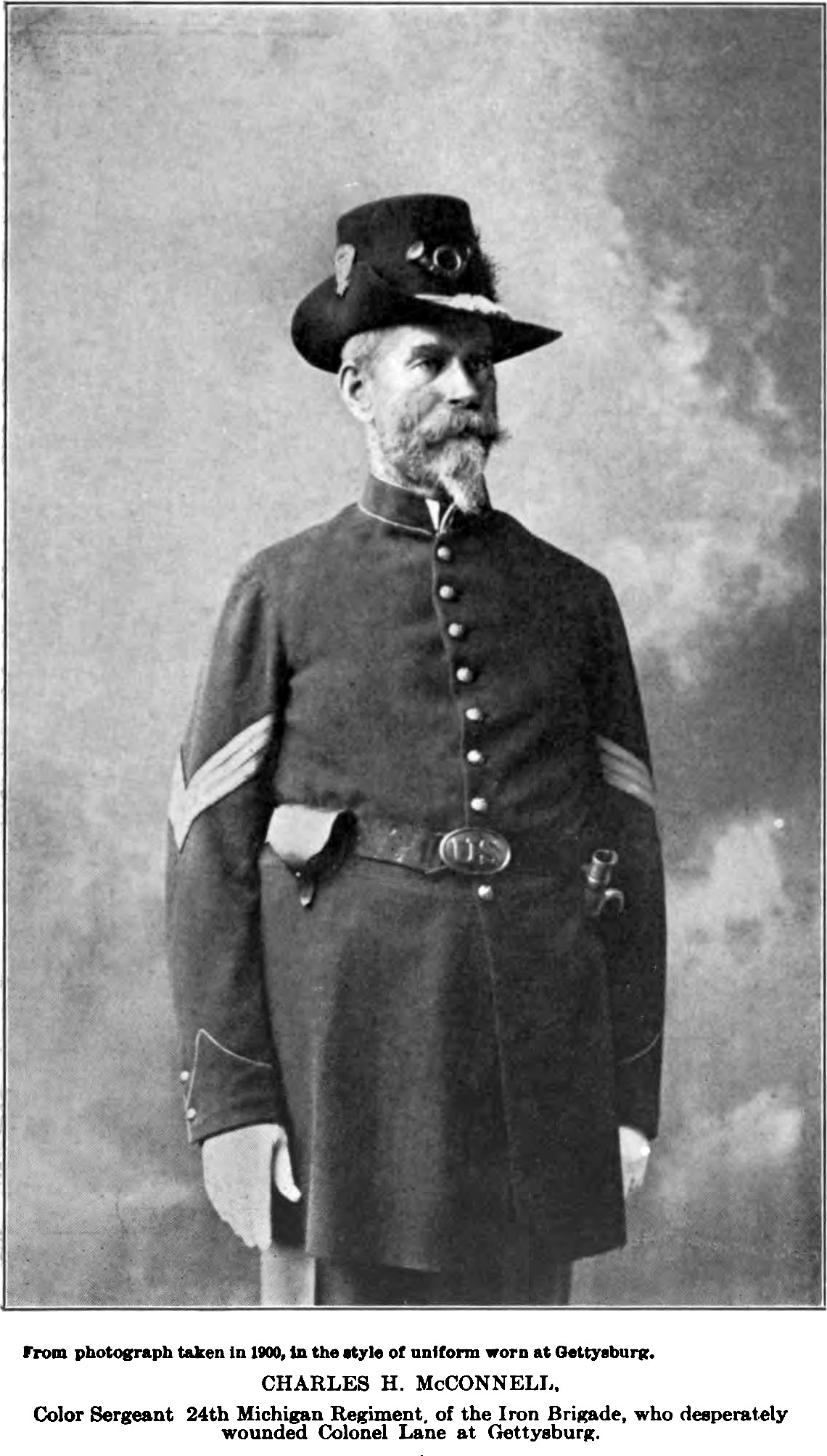Charles H. McConnell
 From photograph taken in 1900,
From photograph taken in 1900,in the style of uniform worn at Gettysburg.
Charles H. McConnell
24th Michigan Regiment of the Iron Brigade,
who desparately wounded Colonnel Lane at Gettysburg.
(Underwood, 1901)
Alfred Theodore Andreas' 1886 book History of Chicago: From the fire of 1871 until 1885 has this biography of Charles H. McConnell:
CHARLES H. MCCONNELL was born at Dublin, Ireland, on October 12, 1841, the eldest son of a family of seven, five sons and two daughters, the children of James K. McConnell, an expert accountant and bookkeeper. The parents, two sons and one daughter, came to America in 1847, residing in New York City, and Charleston, S. C., each one year, and at Ann Arbor, Mich., for five years; finally settling down in Detroit, Mich., which remained the family residence for upwards of twenty years. C. H. McConnell became an apprentice in the old Tribune Once in Detroit, under Henry Barns, one of the pioneer newspaper men of the West, and a man of great influence in Michigan politics.
When Union soldiers were called for, McConnell responded and went to the front in 1862, a private in Co. “B,” 24th Michigan Volunteer Infantry. He sered three years in the “Iron Brigade,” in the Army of the Potomac, and received an honorable discharge in Detroit, Mich., on July 8, 1865, retaining, as mementoes, sound health and a handsome diamond, set with a gold pendant, recording the fact that he carried the colors from Gettysburg into the Wilderness. He reached home from the War at eight o'clock at night, and next morning, at seven o'clock, was working at his trade, for he was reputed the most expert printer in the City and was in demand as foreman and manager. In 1866, he took charge of the job rooms of the Detroit Post, built up the business, secured show-printing contracts to the limit of the capacity of his house, and made a professional reputation both with printers and showmen that commanded respect and confidence, held trade, and was more valuable than capital.
On March 4, 1873, Mr. McConnell came to Chicago and established The National Printing Company. The first offices were at Nos. 116—18 Franklin Street, and the first officers were W. B. Clapp, president, and Charles H. McConnell, secretary and treasurer. They then employed fifty men, and the first year's business amounted to about a hundred thousand dollars. Since 1875 Mr. McConnell has been president and treasurer; and the increase of business (the largest and most complete establishment in America) showed that in their most successful year, 1883, they employed seventy-five men and the volume of their business footed up two hundred dollars. The National Printing Company has suffered greatly from the fire, all communicated. On May 30, 1876, the first time they were burned out the loss was $43,000; on December 30, 1883, $85,000; and on March 30, 1885, $139,000. Only $68,000 insurance was recovered in the last instance, and the loss of $71,000 is a serious blow. The National Printing Company will continue, however. It has so firm a hold upon the patronage of the responsible show managers of this country both East and West, that, while C. H. McConnell is at its head, it will carry its trade. J. H. Haverly was one of the first and heaviest patrons. It was because of Mr. Haverly's financial difficulties in 1883, he having invested too heavily in Colorado mines, that C. H. McConnell was compelled, in self-preservation, to take Haverly's Theater in Chicago, the California Theater in San Francisco, and Haverly's Brooklyn Theater. Mr. McConnell sold the California Theater, in 1883, to Fred W. Bert; still retains the Brooklyn Theater, which is under the acting management of his brother, William A. and Haverly's Chicago Theater. The latter was afterward named the Columbia, the name suggested by the celebrated English actor, Henry Irving, while filling an engagement there in 1885. Charles H. McConnell was married, on May 31, 1878, to Miss Clara V., daughter of Edward Chope, a leading manufacturer of Detroit. Mr. and Mrs. McConnell have one daughter,----Cora E.